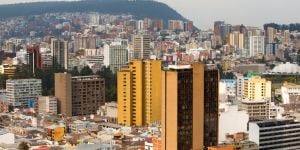Question:
Subscribe to the topic
Post new topic
Does anyone know if 90 days touristic visa is a multiple entry visa for that specific period of 12 months that it was issued?i
which country 90 day visa are you talking about?
how accurate is the info? where did you get it? consulate, lawyer or yourself entering more than one time in Ecuador using the same 90 days visa in 12 months from the date it was issued?
The T3 stamp reflects an expiration date 90 days from the day you enter the country, which I doubt changes if you leave for Peru and return a few days later, but I have no experience on the matter of leaving and returning. I heard a couple years ago they would stamp your passport with another T3 on re-entering, but I heard they closed that loophole.
Of course you can probably extend your visa once you are here for another 6 months using a 12-IX, and beyond that an additional 90 days using a 12-X.
Canadian and US passports are automatically allowed 6 months starting at the date of the first entry to Ecuador. You may leave and come back, the countdown will resume every time you are back on Ecuadorian soil. Once your initial 6 months are close to be completed you may petition an extension (only US$ 30) which will allow you a maximum of 3 more months. So the maximum stay on a tourist Visa is 9 months a year. After that you need to leave Ecuador for at least 3 months before being admitted again under another tourist visa. Hope it helps! Kind regards.
Loving Ecuador wrote:Canadian and US passports are automatically allowed 6 months starting at the date of the first entry to Ecuador. You may leave and come back, the countdown will resume every time you are back on Ecuadorian soil. Once your initial 6 months are close to be completed you may petition an extension (only US$ 30) which will allow you a maximum of 3 more months. So the maximum stay on a tourist Visa is 9 months a year. After that you need to leave Ecuador for at least 3 months before being admitted again under another tourist visa. Hope it helps! Kind regards.
LOL. You just contradicted everything that was said above. That is how it is with any visa discussion.
My guess is Fanita asked the same question on Gringo Tree.
http://www.gringotree.com/cuenca/articl … ogt/T3.php
thanks, I will submit this question there, but most likely I will have the local Ecuadorian consulate opinion before I will plan to come back to Ecuador, because according to the stamp my 90 days visa expires on Jan 17 this year.
You said:
Canadian and US passports are automatically allowed 6 months starting at the date of the first entry to Ecuador.
Well, I assume the rest of us are talking about the T3 stamp which gives you 90 days.
P.S.
I know people come in to the country on 6 month 12-IX visas, but technically they are not automatic, since you have to apply for them at the Embassy.
based on what I read on line in the last year, there are people saying that 90 days tourist visa is single entry and expires on the day specified on the stamp; other people are saying that I have 90 days since I have got the visa on airport and the custom deduct anytime when I go back in the following 12 months the # of the days that I stayed in there each time, till I will end those 90 days. For example, I the visa on stamp is between 20 Oct 2012 and Jan 17 2013. In the first case from 18th of Oct I need 6 mos visa in case that I plan to go back in those 12 month. In the second scenario, because I spent 41 days only on one vacation from Oct 20 last year, looks like I still have 49 days to stay in Ecuador up to Oct 19, 2013 and no extension visa is necessary. That's the difference, which is very important for a tourist
Oh, thats true. It was the wording. My bad. It is 90 days automatically. People usually ask for and is granted another 90 days and then a formal petition needs to be submitted (US$ 30) to request an extension, for another 90 days BEFORE the initial 180 days are completed!
Thanks for the observation Nards, I guess the sun is frying my brain cells today 
Fanita,
If you read the answers to the question posted at this link, you will see 3 persons giving consistent answers, which I assume to be correct.
P.S.
Clearly the T3 stamp shows an expiration date in the passport of 90 days from the date you entered into the country, which is a bit misleading, since it expires only if you were in the country for the whole 90 days consecutively.
oh yah. By the way how is the weather in La Liberdad? lots of people there?
Loving Ecuador,
No problem. I also was confused by the fact the T3 stamp has an expiration date in the passport, but doesn't mean diddly, since it is all about the 90 days you have in the country within a 12 month window.
Now it is my turn for a question which could apply to somebody I know.
Given the fact you are allowed a T3 stamp every 12 months, what happens if a person enters the country on a T3, extends for an additional 6 months using a 12-IX, then follows that up with an additional 3 months using a 12-X, and then leaves to Peru.
If 12 months have passed since they first obtained their T3 stamp, can they re-enter the country on a T3 stamp after spending a day in Peru?
If the answer is yes, it seems as if the person can effectively perpetuate their stay in Ecuador to almost a permanent basis using non-immigrant visas, assuming that the same 6 and 3 month visas are available once again.
would be nice, kind of risky, but according to the ecuadorian official site: http://www.mmrree.gob.ec/eng/services/req_visas.asp T3 visa is actually 12X visa which could be extended up to 180 days. The question is now, if we extend the 12X up to 180 days, would we benefit of 12IX (another 180 days) without leaving the country?
Fanita wrote:T3 visa is actually 12X visa which could be extended up to 180 days.
You know, although that makes sense, I have never seen them mention the word T3 on that website, and I still can't find a reference to it. Do you have a more specific link?
if you check this site: http://internationalliving.com/countries/ecuador/visa/ you will see them talking about T3 but not about 12X, which confirm the above said
if you check this site: http://internationalliving.com/countries/ecuador/visa/ you will see them talking about T3 but not about 12X, which confirm the above said
First of all, referencing international living is sacrilege on this forum because they are evil. Just kidding Edd!
It is too much of stretch for me to assume that because international living mentions the T3 but doesn't mention the 12-X, that the two are the same. I am going to post a question of Gringo Tree to see what people have to say about my question.
I go by the ecuadorian official site where T3 is not stipulated and I assume that people know about T3 from international living or another unofficial links, creating in this way confusions
While there is no reference to a T3, it does mention the time period.
http://www.mmrree.gob.ec/eng/services/visas.asp
While no foreigner requires a visa to enter Ecuador (with the exception of special regimen for Chinese citizens) for a period of 90 days for tourism purposes, they must obtain from the Ecuadorian Embassies or Consulates a VISA to stay in the country for a longer period after fulfilling the requirements established by law.
Here is my first response to the question on Gringo Tree (see above), which I don't think has even been published (how is that for timeliness). I like the fact they refer to it as the "visa shuffle".
"That's exactly right. Not many gringos know about this (probably because lawyers make more money doing residencies).
But my roommate and I have been doing the "visa shuffle" for years, and when we too figured this out and asked about it at Immigration, we were told that this is the way the government set it up originally (the existing immigration laws date back to the '80s and laws in Ecuador --and all civil-law countries -- are very hard to change), in order that immigrants could stay indefinitely on their passports and 12-IXs.
There are, however, a couple potential pitfalls. One is the 12-IX requirement of the return plane ticket. One of our friends got around that by buying a one-way refundable ticket Quito-Miami, then after showing it to Immigration, cashing it in and getting most (minus fees) of his money back.
The harder part is the criminal-background check. There's a requirement that it be current for the 12-IX and the only way to do that is to show up in person in the States, show your ID, and order one. I've heard a rumor (absolutely unconfirmed) that when you apply for a 12-IX from within Ecuador, the requirements are a little less strict. Perhaps the background check could be waived. But I wouldn't bet on it.
As for my roommate and me, we also use the student visa. You have to pay for six or 12 months of school in advance, depending on the length of visa you're applying for, and you have to be enrolled in class when you apply, and you have to show that you passed the classes when you go for another visa. But what the hell: You're basically forced to learn Spanish. My best experiences in Ecuador have been in Spanish school.
Hope this helps.
Articles to help you in your expat project in Ecuador
 The Working Holiday Visa for Ecuador
The Working Holiday Visa for EcuadorEcuador is truly a paradise for adventure and nature lovers, and thanks to the Working Holiday Visa program, they ...
 Permanent Residency in Ecuador
Permanent Residency in EcuadorEcuador is calling and you are ready to go and experience all that this gorgeous country has to offer. However, ...
 Getting Visas in Ecuador
Getting Visas in EcuadorFirst, do not be afraid of the Visas process. It is only a process of providing documents, getting them ...
 Resident Visas in Ecuador
Resident Visas in EcuadorRESIDENT VISAS IN ECUADOR - GENERAL INFORMATION
 General visa requirements in Ecuador
General visa requirements in EcuadorEcuador's visa policy, one of the world's most lenient, makes it easy for tourists from almost all the countries ...
 Food in Ecuador
Food in EcuadorWhat kind of food will you find in restaurants, cafes, and private homes in Ecuador? Many restaurants in Ecuador ...
 Opening a bank account in Ecuador
Opening a bank account in EcuadorA few years back, an expat would just breeze into an Ecuadorian bank, flash their passport and a bank account ...
 Healthcare in Ecuador
Healthcare in EcuadorEcuador, as a fast-developing nation, has laws that are constantly evolving, but one thing is certain: the ongoing ...
Find more topics on the Ecuador forum



